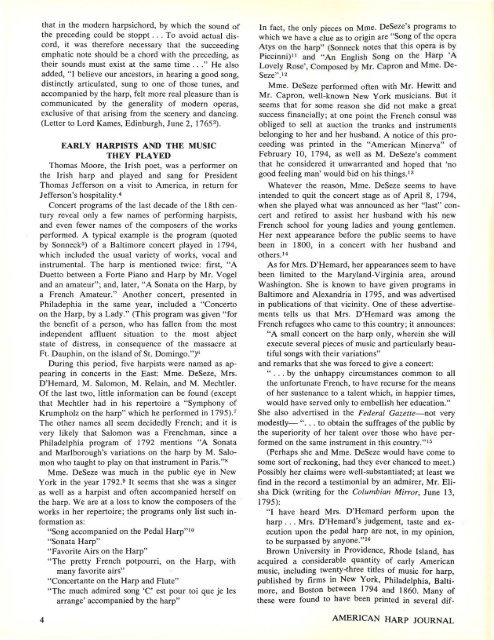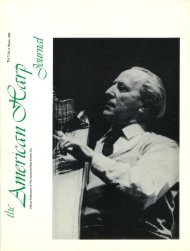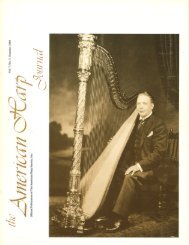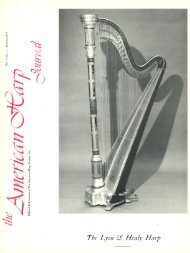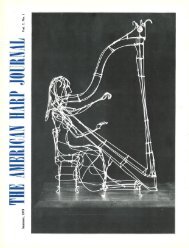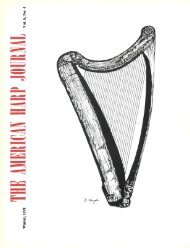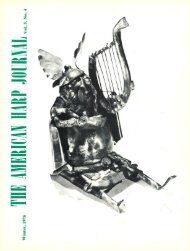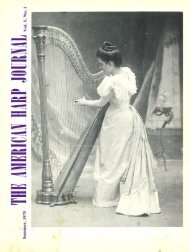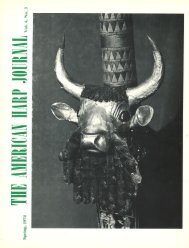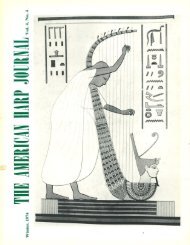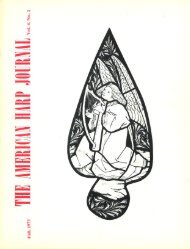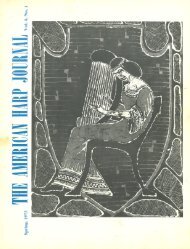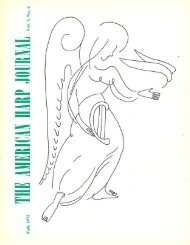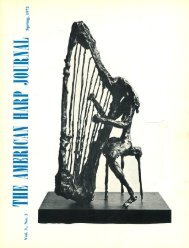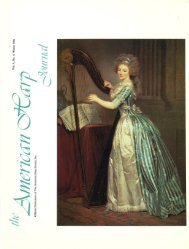Create successful ePaper yourself
Turn your PDF publications into a flip-book with our unique Google optimized e-Paper software.
that in the modern harpsichord, by which the sound of<br />
the preceding could be stoppt ... To avoid actual discord,<br />
it was therefore necessary that the succeeding<br />
emphatic note should be a chord with the preceding, as<br />
their sounds must exist at the same time ... " He also<br />
added, "I believe our ancestors, in hearing a good song,<br />
distinctly articulated, sung to one of those tunes, and<br />
accompanied by the harp, felt more real pleasure than is<br />
communicated by the generality of modern operas,<br />
exclusive of that arising from the scenery and dancing.<br />
(Letter to Lord Karnes, Edinburgh, June 2, 1765 3 ).<br />
EARLY HARPISTS AND THE MUSIC<br />
THEY PLAYED<br />
Thomas Moore, the Irish poet, was a performer on<br />
the Irish harp and played and sang for President<br />
Thomas Jefferson on a visit to America, in return for<br />
Jefferson's hospitality.4<br />
Concert programs of the last decade of the 18th century<br />
reveal only a few names of performing harpists,<br />
and even fewer names of the composers of the works<br />
performed. A typical example is the program (quoted<br />
by Sonneck5) of a Baltimore concert played in 1794,<br />
which included the usual variety of works, vocal and<br />
instrumental. The harp is mentioned twice: first, "A<br />
Duetto between a Forte Piano and Harp by Mr. Vogel<br />
and an amateur"; and, later, "A Sonata on the Harp, by<br />
a French Amateur." Another concert, presented in<br />
Philadephia in the same year, included a "Concerto<br />
on the Harp, by a Lady." (This program was given "for<br />
the benefit of a person, who has fallen from the most<br />
independent affluent situation to the most abject<br />
state of distress, in consequence of the massacre at<br />
Ft. Dauphin, on the island of St. Domingo.")"<br />
During this period, five harpists were named as appearing<br />
in concerts in the East: Mme. DeSeze, Mrs.<br />
D'Hemard, M. Salomon, M. Relain, and M. Mechtler.<br />
Of the last two, little information can be found (except<br />
that Mechtler had in his repertoire a "Symphony of<br />
Krumpholz on the harp" which he performed in 1795).7<br />
The other names all seem decidedly French; and it is<br />
very likely that Salomon was a Frenchman, since a<br />
Philadelphia program of 1792 mentions "A Sonata<br />
and Marlborough's variations on the harp by M. Salomon<br />
who taught to play on that instrument in Paris." 8<br />
Mme. DeSeze was much in the public eye in New<br />
York in the year 1792. 9 It seems that she was a singer<br />
as well as a harpist and often accompanied herself on<br />
the harp. We are at a loss to know the composers of the<br />
works in her repertoire; the pro~rams only list such information<br />
as:<br />
"Song accompanied on the Pedal Harp" 10<br />
"Sonata Harp"<br />
"Favorite Airs on the Harp"<br />
"The pretty French potpourri, on the Harp, with<br />
many favorite airs"<br />
"Concertante on the Harp and Flute"<br />
"The much admired song 'C' est pour toi que je les<br />
arrange' accompanied by the harp"<br />
4<br />
In fact, the only pieces on Mme. DeSeze's programs to<br />
which we have a clue as to origin are "Song of the opera<br />
Aty on the harp' (Sonneck notes that this opera is by<br />
Piccinni) 11 and "An Engli h Song on the Harp 'A<br />
Lovely Rose', Composed by Mr. Capr n and Mme. De<br />
Seze".12<br />
Mme. DeSeze performed often with Mr. Hewitt and<br />
Mr. Capron, well-known New York musicians. But it<br />
seems that for some reason she did not make a great<br />
success financially; at one point the French consul was<br />
obliged to sell at auction the trunks and instruments<br />
belonging to her and her husband. A notice of this proceeding<br />
was printed in the "American Minerva" of<br />
February 10, 1794, as well as M. DeSeze's comment<br />
that he considered it unwarranted and hoped that 'no<br />
good feeling man' would bid on his things. 13<br />
Whatever the reason, Mme. DeSeze seems to have<br />
intended to quit the concert stage as of April 8, 1794,<br />
when she played what was announced as her "last" concert<br />
and retired to assist her husband with his new<br />
French school for young ladies and young gentlemen.<br />
Her next appearance before the public seems to have<br />
been in 1800, in a concert with her husband and<br />
others. 14<br />
As for Mrs. D'Hemard, her appearances seem to have<br />
been limited to the Maryland-Virginia area, around<br />
Washington. She is known to have given programs in<br />
Baltimore and Alexandria in 1795, and was advertised<br />
in publications of that vicinity. One of these advertisements<br />
tells us that Mrs. D'Hemard was among the<br />
French refugees who came to this country; it announces:<br />
"A small concert on the harp only, wherein she will<br />
execute several pieces of music and particularly beautiful<br />
songs with their variations"<br />
and remarks that she was forced to give a concert:<br />
" ... by the unhappy circumstances common to all<br />
the unfortunate French, to have recurse for the means<br />
of her sustenance to a talent which, in happier times,<br />
would have served only to embellish her education."<br />
She also advertised in the Federal Gazette-not very<br />
modestly- "... to obtain the suffrages of the public by<br />
the superiority of her talent over those who have performed<br />
on the same instrument in this country." 15<br />
(Perhaps she and Mme. DeSeze would have come to<br />
some sort of reckoning, had they ever chanced to meet.)<br />
Possibly her claims were well-substantiated; at least we<br />
find in the record a testimonial by an admirer, Mr. Elisha<br />
Dick (writing for the Columbian Mirror, June 13,<br />
1795):<br />
"I have heard Mrs. D'Hemard perform upon the<br />
harp ... Mrs. D'Hemard's judgement, taste and execution<br />
upon the pedal harp are not, in my opinion,<br />
to be surpassed by anyone." 16<br />
Brown University in Providence, Rhode Island, has<br />
acquired a considerable quantity of early American<br />
music, including twenty-three titles of music for harp,<br />
published by firms in New York, Philadelphia, Baltimore,<br />
and Boston between 1794 and 1860. Many of<br />
these were found to have been printed in several dif-<br />
AMERICAN HARP JOURNAL


